Every day we make choices and have routines and habits that make up our daily lives.
Some habits are clearly better than others.
So, what habits are going to make the biggest difference in your life?
And what can you do that will really impact your overall wellness in the best way?
Setting Daily Goals and Priorities
One very powerful habit is setting goals based on your priorities.
Long term goals are helpful. They give you a sense of purpose and something to focus on. But the things you do consistently on a daily basis are the foundation blocks of your life. Some people might have trouble setting goals and sticking to them. And others just like to see how life unfolds without much direction.
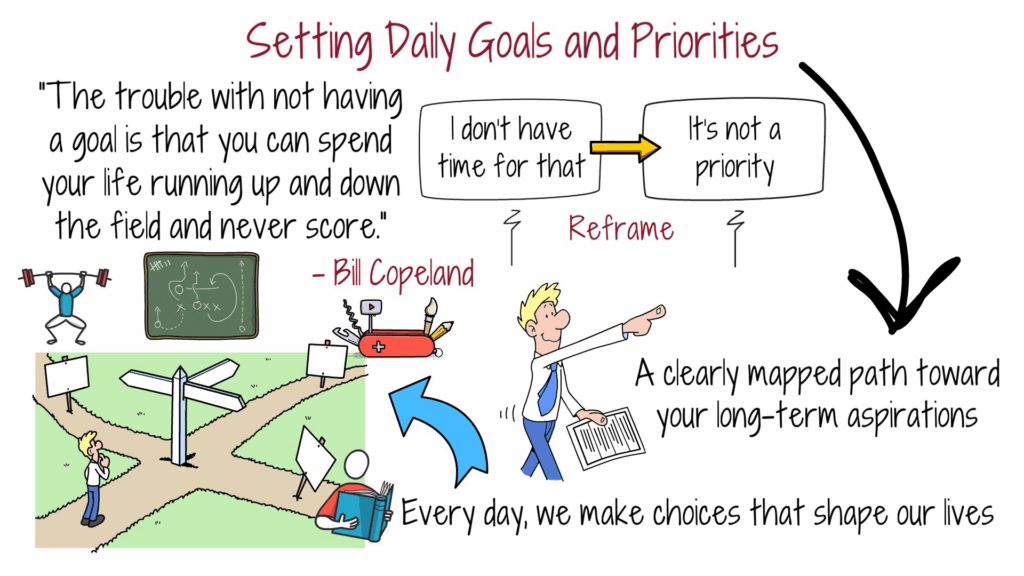
Author Bill Copeland wrote,
“The trouble with not having a goal is that you can spend your life running up and down the field and never score.”
Start by setting daily goals. For example, if you set a fitness goal of lifting a certain amount of weight, it would be necessary to make time each day for your daily workout. If you only engaged in weight training once in a while, you wouldn’t reach your final goal.
If you have trouble staying motivated and tell yourself, “I don’t have time for that”, try rephrasing it to, “It’s not a priority for me.” Then think about how that feels. We tend to prioritize things that matter to us, so when thinking about your goals and habits, ask yourself how important it is. What is your health or life situation worth to you? If it matters, you’ll find the time to make it happen.
Recognize what matters and make it a priority, and then build goals around those things. What you do on a daily basis is going to add up exponentially in the long term.
Develop a Consistent Sleep Schedule
Sleep is one area of your life that might be vastly underrated. Burning the candle at both ends to try and fit in as many activities as possible may seem like a good strategy. But if you’ve tried that for any length of time, you probably know it’s a recipe for a quick burnout.
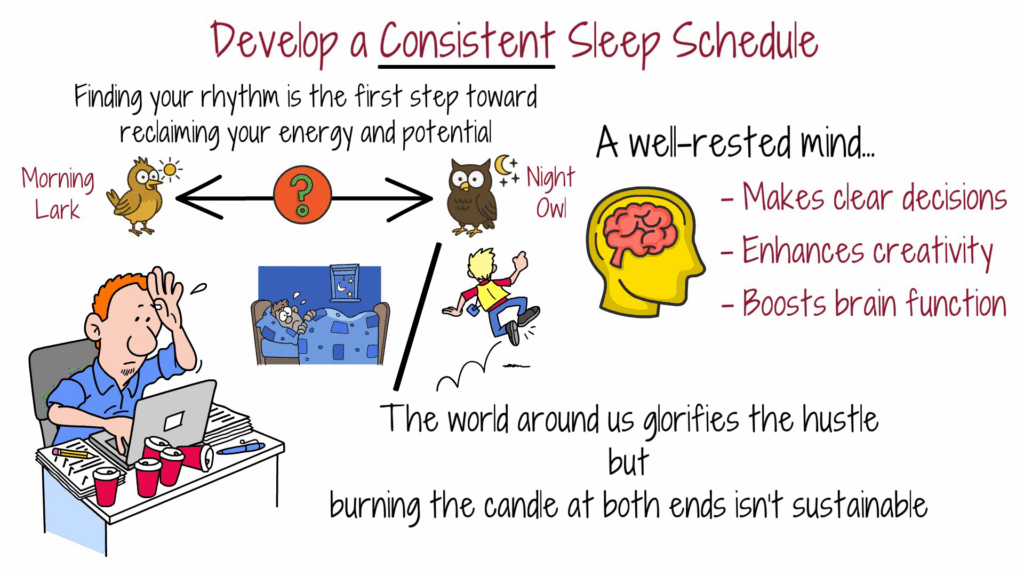
Getting enough sleep and staying on a schedule is a much better plan. If your sleep cycles are all over the place, your mind is going to be that way too. Sleep promotes healthy brain function, which is central to good health overall. Other benefits of sleep include better decision making and increased focus. We tend to learn better when we are rested, and all of our body systems can function more effectively.
Going to bed and getting up at the same time every day, even on weekends, can help you get the maximum benefits of sleep. By being consistent, it triggers your body as to when it’s time to sleep, and can help you fall asleep more easily. Likewise, it may make it easier to wake up in the morning when your body is anticipating it. This sets your “body clock”, also known as a circadian clock, which cues your sleep-wake rhythm.
But when is the best time to go to bed or get up in the morning? Well, it could depend on your natural tendency of when you feel most sleepy vs. awake. In the 1970’s, James A. Horne and Olov Ostberg developed a 19-questionnaire called the MEQ (Morningness-Eveningness Questionnaire). With these answers, they could determine a person’s natural sleep/wake pattern and energy shifts.
This simple test helped to identify what type of schedule might work best for certain kinds of people, and was given names of animals that had the same preferences. For example, people who naturally felt more energetic and alert in the early part of the day might be considered Morning Larks. And someone who was more productive toward evening hours might have similarities to a Night Owl. Author and Psychologist Michael Breus, who wrote, The Power of When expanded the earlier systems of waking and sleeping, and determined four types: lions, bears, wolves, and dolphins.
To determine your personal chronotype, start by asking yourself what time you want to get up in the morning. Then count backwards about 7 hours. For instance, if you are an early riser, and prefer to get up at 5 am, you would want to go to bed by at least 10 pm the night before. If you are a person who gets more done at night, you may be staying up till 1am, but then sleep the next morning till about 8 am.
Sleep schedules can sometimes be interrupted by things like travel, caffeine, time changes, and parenting. But if you can find the pattern that works best for you, and stay on track even on weekends and holidays, you are likely to get the most benefits.
Have a Regular Exercise Routine
While sleep is one habit that can make a profound difference in your life, the other side of that is exercise. Exercise and sleep go hand in hand. Exercise can help you sleep better, and sleep can give you the energy and motivation to exercise!
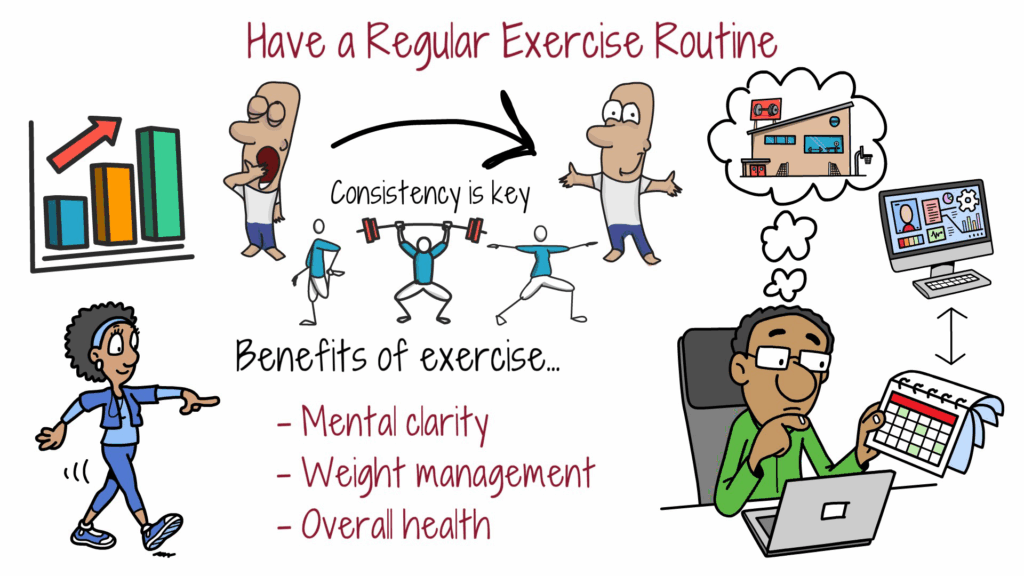
Most people have heard that exercise can also improve brain health, manage weight, and strengthen bones and muscles. Our bodies are built for movement. Even daily walks can make one of the most significant differences in our overall health.
To maximize the benefits of exercise, it’s important to be consistent. Occasional workouts aren’t enough to get the results that are available to you through exercise. So creating a daily plan that includes physical activity is a good way to start.
Be sure to Include warm up and cool down times, strength training, walking, cardio and balance/coordination for an overall benefit.
Having an app or other way to track your progress can be helpful to keep you going. Having a workout partner can make it more fun.
Set Aside Time for Daily Reading
There are few things that can make as big of a difference in life than a good reading habit.
Something like watching TV is a passive form of entertainment but reading takes you to another level. By engaging your brain in a more active way, it can improve cognitive function and mental agility. Reading creates more neural activity by stimulating many parts of the brain.
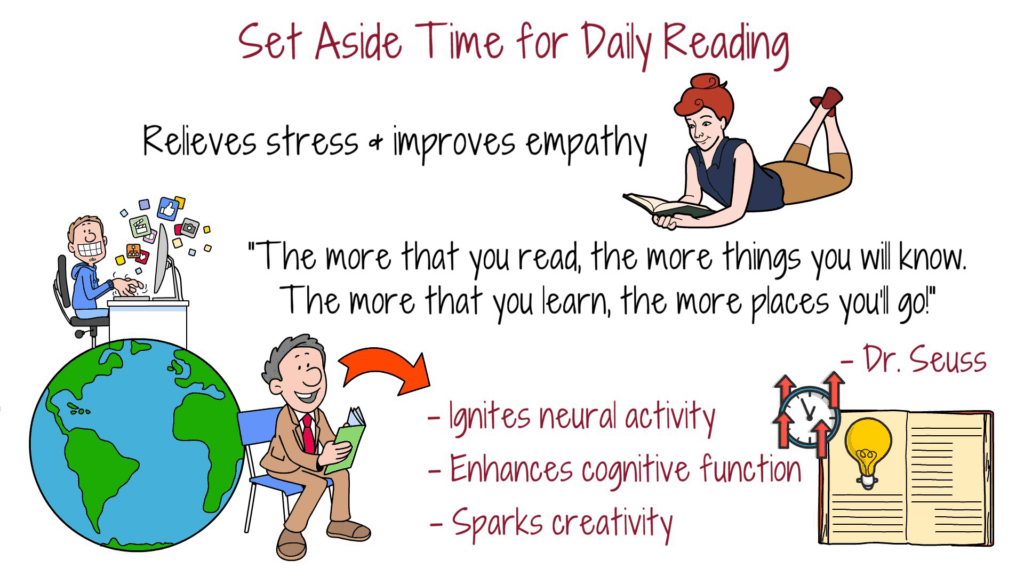
For example, it can promote relaxation and alleviate stress. Reading can be a form of escape when you are enthralled in a good book. It can develop better language and vocabulary and expand your knowledge of things like geography and different cultures. It can promote empathy and understanding of other people and the world.
On a whimsical note, children’s author Dr. Seuss wrote,
“The more that you read, the more things you will know. The more that you learn, the more places you’ll go!”
Reading can stimulate your imagination, give you new ideas and help you to be more creative. You may end up being a better thinker and even a better writer by being exposed to different writing styles.
To develop a daily reading habit, start with just 10 minutes per day. Have reading material readily available and read things that make you want to keep reading. There’s a never ending library of reading material so find something that mirrors your interests, triggers your imagination, or teaches you something new.
Nobel prize winning Scientist Harold E. Varmus stated,
“My ideal Summer day was reading on the porch.”
Spend Time With People You Like
One last tip that can really make a difference in your overall health, your mood, and your life perspective, is having enjoyable relationships. Being around other people is good for you. Just make sure they’re people who bring positive things to your life.
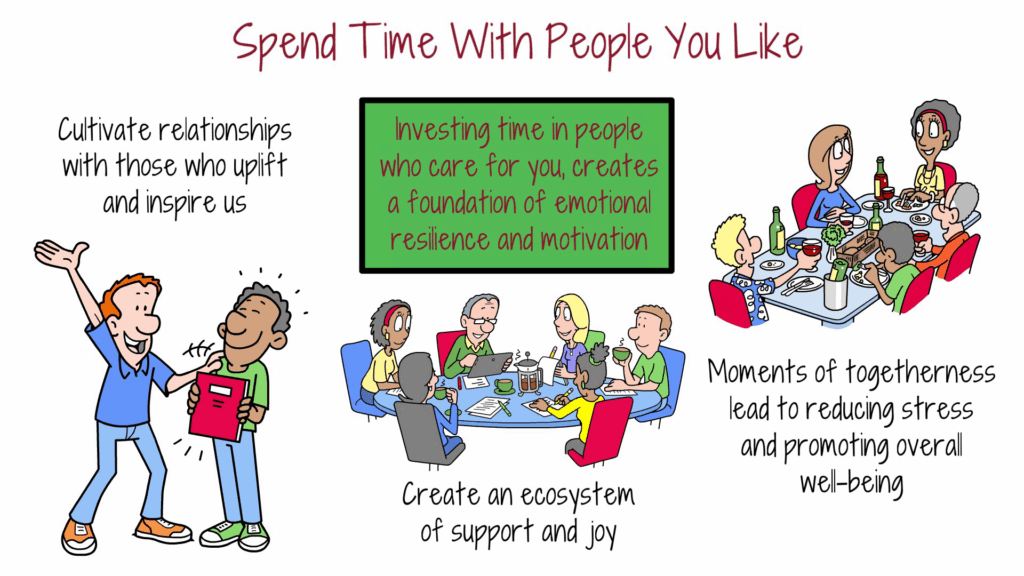
If you laugh, enjoy common interests, and find connections with people, you may find yourself less stressed and more open to new thoughts and experiences. When we are engaged in enjoyable activities our brains release chemicals that promote good health and well being.
Final Thoughts
Small habits can bring a giant return on your overall life and wellness. You just have to choose the right ones.
Author Robert Collier wrote,
“Success is the sum of small efforts, repeated day-in and day-out.”
So make the best use of your time by choosing habits that pack the most punch.
